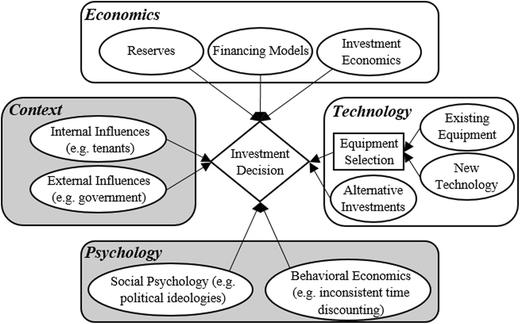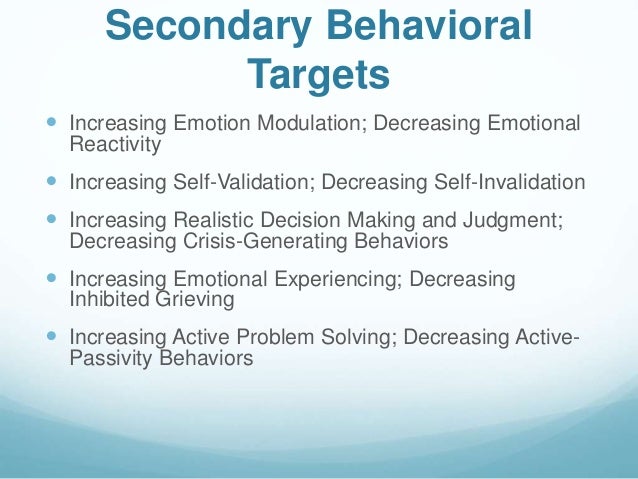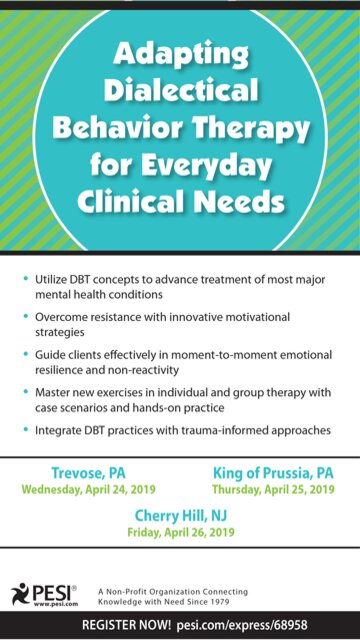- Dialectical Behavioral Therapy Pdf
- 38 Secondary Emotionsdialectical Behavioral Training Post Test
- 38 Secondary Emotionsdialectical Behavioral Training Certification
- Dialectical Behavioral Therapy Dbt Techniques
Marsha Linehan, the founder of DBT, developed a 6-step technique that will help you look more closely at the way your emotions spiral out of control. When you familiarize yourself with this technique, you will be able to apply it next time you feel like you are burdened by an avalanche of overwhelming emotions that are piling up.
Sometimes we are not even aware of everything that we felt in the situation, or how we were actually thinking about the situation. Becoming mindful about these six phases, as opposed to being on autopilot can make a world of difference between a healthy and a harmful way of coping with a emotional whirlwind.
Step One: Describe the Situation
Think of a situation from the past where you felt overwhelmed with a lot of emotions. It can be about any aspect of your life. Describe the situation - what happened, where it happened, who was involved.

Dialectical behavior therapy (DBT) is an evidence-based psychotherapy that began with efforts to treat borderline personality disorder (also known as Emotional Instability Disorder). There is evidence that DBT can be useful in treating mood disorders, suicidal ideation, and for change in behavioral patterns such as self-harm, and substance abuse. DBT evolved into a process in which the. What is Dialectical Behavior Therapy? Dialectical Behavior Therapy (DBT) is a type of cognitive-behavioral therapy that focuses on the psychosocial aspects of therapy, emphasizing the importance of a collaborative relationship, support for the client, and the development of skills for dealing with highly emotional situations (Psych Central, 2016). The new generation of Emotional Intelligence training focuses on behavior. The new generation of Emotional Intelligence training programs focuses on these behavioral aspects, so we now distinguish between ‘Emotional Intelligence’, which focuses on emotion awareness, recognition, and understanding, and ‘Behavioral Intelligence’, which represents practical skills that directly influence. These 9 criteria can be organized into areas to target the acquisition of behavioral skills. Chaotic relationships. Identity disturbance. Suicidal or self-harm behavior. Mood instability. Feelings of emptiness. Evaluation of behavioural skills training for teaching abduction-prevention skills to young children. Journal of Applied Behavior Analysis, 38, 67-78. Miles, N.I., & Wilder, D.A. The effects of behavioral skills training on caregiver implementation of guided compliance. Journal of Applied Behavior Analysis, 42(2), 405-410.
Step Two: What Caused the Situation
Write down your thoughts on what you think caused the situation. The way you explain the situation to yourself will shape your emotions about the situation. Try to remember the situation you picked and be honest about what your thinking process was like during the event. What do you think caused the main aspects of the situation?
Step Three: Primary and Secondary Emotions
Now that you described the situation and what you think caused it, it's time to describe how you felt as a result. Try to remember what your emotions were. What did you first feel? Were there other emotions that you felt as a response to the first one? For example, maybe first you felt disappointed at somebody, and very shortly afterwards you felt anger and self-hatred, and eventually that led to you feeling depressed. When you feel overwhelming emotions, you probably have physical sensations in your body because of the emotions. Do you remember how your body felt during the situation? Were you tense, fast heart-beat, sweating? Perhaps you felt like crying and your body started trembling.
Dialectical Behavioral Therapy Pdf
Step Four: Identify Your Urges
What did you want to do as a result of your emotions? What was your first urge? What action did you want to take? This is not necessarily what you eventually did, it can be just a thought that you briefly had. This is a very important step as you become more used to this technique. Next time you find yourself in a situation where you experience overwhelming emotions, recognizing your urges can help you to not automatically act on them.

Step Five: What Did You Do?
In this step, think about what you actually did. What action did you take as a result of your emotions? Take your time and try to remember. Did you have an argument with somebody because you felt really hurt and angry? Try to remember what you said to the other person if there are other people involved in the situation.
Step Six: Outcomes
38 Secondary Emotionsdialectical Behavioral Training Post Test
How did this situation, your emotions and your resulting actions affected you later? Was the outcome of this situation good for you or not really? This step focuses on the consequences that you may experienced in the longer term. Being observant and honest with ourselves about whether the outcome of our emotionally-induced actions is good or bad for us can be very important for making a change.
38 Secondary Emotionsdialectical Behavioral Training Certification
Example

Dialectical Behavioral Therapy Dbt Techniques
| Phase | Experience |
|---|---|
| Describe the situation | I had a usual day at work, I came home where I live alone, and had an evening by myself. There was nothing extraordinary about the day. |
| What caused the situation? | I live a boring life, I avoid everything that is out of my comfort-zone. So just like every other day, nothing exciting happened. |
| Primary and secondary emotions | At first I felt really bored, but this grew into a feeling of sadness and disappointment about the lack of interesting things going on in my life. By the end of the day I just felt really empty. |
| Identify your urges | I didn't feel like doing anything useful, I just wanted to sit in front of the TV and drink wine. |
| What did you do? | That is exactly what I did. |
| Outcome | I drank more than I wanted to, I woke up the next morning, hung-over with a terrible migraine. I had to call in sick and I missed work. |
